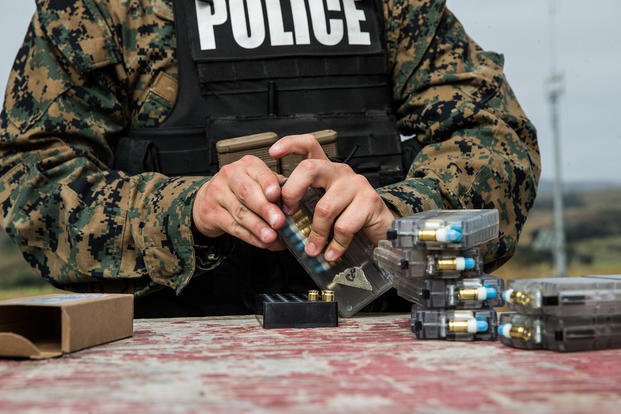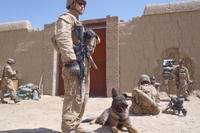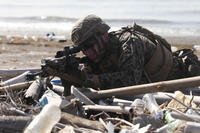When things get out of hand and violence ensues, very few people willingly run toward chaos. The Special Reaction Team for Marine Corps Support Facility New Orleans is part of that group of people who run toward danger.
SRT officers serve as first responders to any dangerous situations that may arise at the MARCORSPTFAC. This can include a suspect barricaded inside a room, a hostage situation or an active shooter.
"We train specifically for high-risk situations," said Ryan Apple, a Marine Corps police officer and native of Pensacola, Florida.
The SRT is made up of seven team members who are handpicked for their physical abilities and marksmanship skills. Each member must achieve a first-class physical fitness test and qualify as an expert, using a service rifle and pistol. However, the ultimate test is working together as a team.
"A lot of guys try out, but not very many make it," said Stanley Pawlus, the SRT team leader and a native of New Orleans. "You can be super strong and be an expert marksman, but if you don't connect with the rest of the team when we run through drills, it just isn't going to work."
According to SRT members, the amount of time it takes for a local SWAT team to assemble, put together the required gear, arrive on the scene and be briefed on the current situation can take hours. With a special purpose unit such as the SRT always available at the support facility, its response time is much faster. Another advantage offered by the SRT is its familiarity with the building it is assigned to defend.
"We know the building extremely well," Pawlus said. "We've trained inside the building, using different types of scenarios. You train like you fight, so we do our best to change things every time we conduct training. It helps to keep our skills sharp."
For one particular training exercise, SRT members worked with the U.S. Marshals Gulf Coast Regional Fugitive Task Force to improve advanced compound infiltration and room-clearing techniques. They split into small teams and responded to mock emergencies and situations, ranging from simple arrests to high-risk, multiple-armed-suspect scenarios. For more realistic training, Marines on station acted as role players for the exercise.
"When we do train, we prefer using Marines because they are trained to fight and it adds an extra edge to our scenarios," Pawlus said. "Even the Marines with non-combat-related jobs still get to be a part of useful training, which helps them maintain readiness."
Each Marine played the part of either an innocent bystander or a suspect, allowing the opportunity for the Marines and officers to see how each force operates and learns from their mistakes.
"It was really unique training that you don't get to see very often," said Sgt. Andrew Miller, a supply clerk with Headquarters and Service Company, 4th Marine Division, and native of Howard City, Michigan. "When you're acting as a role player, you get to see how things play out. Even just watching from a distance, you can at least have an idea of what to do if there is an emergency situation."
This was not the first time these officers had the chance to work with a specialized law enforcement unit.
"We've worked with a lot of different agencies that specialize in tactical situations like this," said Kevin Gamber, a Marine Corps police officer and native of Philadelphia. "[The] New Orleans police department [special weapons and tactics] team, [the Federal Bureau of Investigation] and the [Drug Enforcement Agency's] special operations division have all trained with us."
While working with various law enforcement agencies, SRT members have become familiar with various procedures and tactics that are specific to special operations teams across the country. The SRT has attended FBI SWAT team training evolutions that cover small unit operations. The New Orleans Police Department offered SRT members the chance to complete their SWAT course and work with their special operations officers. Situations can arise in which the SRT will have to work with other forces, and this training helps prepare for it, Pawlus said.
"If a situation arises here and we have to work with another group of officers, everybody is already on the same page because we've established that good working relationship," Pawlus said.
Although the SRT's specialty focuses specifically on room-clearing operations, it also hones its all-around law enforcement capabilities by learning from others.
"It is always good experience for us to be able to work with other organizations, like the fugitive task force, because they do operations every day," Gamber said. "The task force is made up of a variety of different law enforcement officers, so we all can share ideas and information from our own experiences."
The SRT not only has worked alongside other special operations law enforcement units, but it also has completed various training schools through many of the same agencies.
"It is extremely helpful for us to be able to integrate into another unit's squad without missing a beat," Pawlus said.
The SRT for MARCORSPTFAC New Orleans continues to train and establish themselves as a fully functional force, prepared to tackle any threat that may arise.
Want to Know More About the Military?
Be sure to get the latest news about the U.S. military, as well as critical info about how to join and all the benefits of service. Subscribe to Military.com and receive customized updates delivered straight to your inbox.











